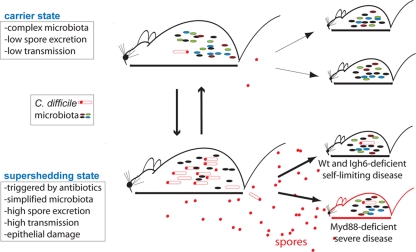FIG. 6.
Relationship between C. difficile carrier state and supershedding state in response to antibiotic treatment and role of the host immune system in severe disease. C. difficile carrier mice possess a stable and diverse intestinal microbiota community (small rods) which includes low levels of C. difficile (red rods with spores). As a result, carrier mice excrete low levels of spores and are poor donors for C. difficile infection. Antibiotic treatment of carrier mice reduces the diversity of the intestinal microbiota community, allowing C. difficile to proliferate and sporulate (red circles). As a result, a supershedding state occurs with high levels of spore excretion and efficient host-to-host transmission. Withdrawing the antibiotic allows the intestinal microbiota to rediversify and suppresses C. difficile levels, thereby reestablishing the carrier state and reducing the contagiousness of the host. Transmission of C. difficile to Myd88-deficient mice, but not transmission of C. difficile to Igh6−/− mice, results in severe disease, implicating Toll-like receptor signaling in protection against virulent C. difficile overgrowth. Wt, wild type.

